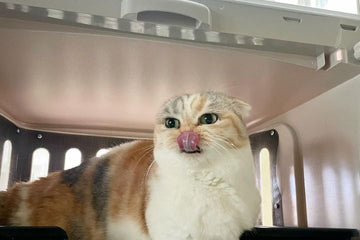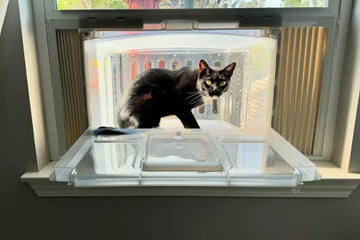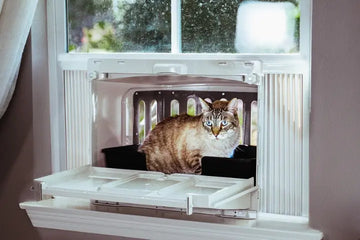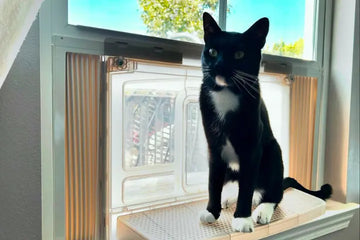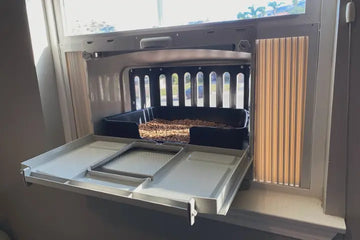Managing cat litter box odors is a common challenge for cat owners. It's not just about maintaining a pleasant smell in the home; it's crucial for the health and well-being of both the cat and the family. Odors can be strong and persistent, emanating from various sources like cat waste, the type of litter used, and the frequency of litter box cleaning. Addressing these odors effectively requires a combination of good litter box maintenance, the right choice of litter, and attention to the cat's diet and health. This introductory guide sets the foundation for understanding the complexities of cat litter box odor eliminator strategies.
Understanding the Root Causes of Litter Box Odors
Cats produce two main types of waste: urine and feces, each contributing differently to litter box odors. Urine has a strong ammonia smell, which intensifies if not cleaned promptly. Feces, on the other hand, carry a different, equally pungent odor due to the breakdown of digestive substances. Understanding these waste types is essential for effectively addressing cat litter box odor eliminator strategies.
A cat's diet plays a significant role in the odor of their waste. Foods high in fish or artificial additives can lead to more pungent smells. A balanced diet, rich in digestible proteins and fibers, can result in less odorous waste. Paying attention to what your cat eats is an important step in eliminating cat litter odor. Owners should consider the quality and ingredients of their cat's food as part of an overall strategy to control litter box smells.
There are several misconceptions about cat litter odors. One common belief is that more fragrance in the litter will control odors better, but this can often mask smells temporarily without eliminating them. Another is that all cat litters are the same in controlling odors, which is not true as different litters have varying efficacy in odor control. Understanding these misconceptions is important in choosing the best cat litter for odor control and not just relying on scents or brand reputation.
Several factors influence the intensity of litter box odors. The cat's age, health, and hydration level play a role, as dehydrated cats can produce more concentrated urine with a stronger smell. The cleanliness of the litter box, the type of litter used, and the home's ventilation also significantly affect odor intensity. Properly managing these factors can help effectively reduce litter box smell and maintain a pleasant home environment.
Evaluating Different Types of Cat Litter
Selecting the right cat litter is essential for effective odor control in your home. Here's a quick overview:
- Clumping Clay Litters: Excellent absorbency and clumping, cost-effective, may be dusty.
- Silica Gel Litters: High absorbency, low-dust, non-clumping, more expensive.
-
Eco-Friendly Litters:
- Pine: Natural odor control, biodegradable.
- Corn: Good clumping, effective odor control.
- Recycled Paper: Highly absorbent, dust-free, allergy-friendly.
-
Litters with Odor-Neutralizing Agents:
- Baking Soda: Natural deodorizer.
- Activated Charcoal: Absorbs odors and moisture.
Each type of litter offers unique benefits and challenges in terms of odor control. The choice largely depends on personal preferences, the cat's acceptance, and environmental considerations. By understanding these options, you can choose the best odor eliminating cat litter that suits your needs and keeps your home odor-free.
Best Practices in Litter Box Maintenance
Regular scooping is critical for keeping the litter box odor-free. Ideally, waste should be removed at least once a day. This prevents the buildup of ammonia from urine and the lingering smell of feces. The entire litter should be changed regularly as well – typically every two weeks for clumping litters and every week for non-clumping varieties. Adhering to this schedule is vital for maintaining an effective cat litter smell control regime and ensuring a hygienic environment for your cat.
The number of litter boxes in a home should correspond to the number of cats plus one. This means if you have two cats, you should have three litter boxes. This ratio helps in reducing conflicts among cats and keeps the boxes cleaner, as each cat has multiple options for elimination. Multiple boxes help distribute the usage and reduce the concentration of odors in any one box, contributing to overall odor control litter box effectiveness. Along with having enough litter boxes, it's important to place them in different locations to avoid territorial issues. Each cat may prefer a different type of litter, so experimenting with various litters might be necessary.
Cleaning and Deodorizing the Litter Box
Maintaining a clean and odor-free litter box is essential for the health and comfort of your cat, as well as for keeping your home smelling fresh. These methods are safe, cost-effective, and environmentally friendly, making them an excellent choice for conscientious cat owners.
Here's a breakdown of these methods:
- Use Mild Detergents: Safe for cats, eliminates bacteria and odors.
-
Natural Cleaning Solutions:
- Vinegar: Natural disinfectant, neutralizes urine odors.
- Baking Soda: Absorbs and neutralizes odors.
- Regular Cleaning Schedule: Deep clean every two weeks to prevent bacteria buildup.
-
DIY Deodorizing:
- Dried Lavender or Mint: Natural fragrance.
- Open Container of Baking Soda: Absorbs ambient odors.
By incorporating these methods into your litter box maintenance routine, you can ensure a reduce litter box smell environment, contributing to a healthier and more pleasant home for both you and your cat.
Additional Strategies for Odor Control
Air purifiers can be a valuable addition to your odor control strategy. They work by filtering out particles from the air, including those that contribute to litter box smells. Look for air purifiers with activated carbon filters, as they are particularly effective at absorbing and neutralizing odors. While they don't replace regular cleaning, air purifiers can significantly reduce ambient odors, making your home more comfortable and contributing to the overall effectiveness of your cat litter smell control efforts.
Deodorizing sprays specifically designed for litter boxes can be effective in managing odors between cleanings. These sprays work by neutralizing odors, rather than just masking them. It's important to choose sprays that are non-toxic and safe for cats. When used in conjunction with regular cleaning, these sprays can enhance the best cat litter for odor control, providing an extra layer of freshness in your home.
Certain indoor plants are known for their natural odor-absorbing qualities. Plants like spider plants, bamboo palms, and peace lilies can help purify the air in your home. While they won't eliminate litter box odors, they can improve overall air quality and contribute to a fresher-smelling environment. Always ensure that any plants you bring into your home are safe for cats, as some can be toxic if ingested.
The design of your litter box can also impact its ability to control odors. Boxes with higher walls or lids can help contain smells. Some modern catio litter boxes come with built-in ventilation systems or filters that actively work to neutralize odors. While these designs might be more expensive, they can be a worthwhile investment for those seeking the best odor control litter box. It’s important to consider your cat's preferences and habits when choosing a litter box design, as some cats might not like enclosed or high-walled boxes.
Dietary Adjustments to Reduce Odor
Certain types of cat food can intensify the odor of your cat's waste. Foods that are high in artificial additives, low-quality proteins, or are difficult for your cat to digest can result in stronger-smelling waste. Fish-based foods, in particular, are often culprits for more pungent odors. Observing your cat's response to different types of food and noting any changes in litter box odor can help you identify which foods to avoid. This awareness is a key step in achieving the best odor control litter in your home.
To reduce litter box odors, consider adjusting your cat's diet to include high-quality proteins and fewer fillers. Look for cat foods that list real meat as the first ingredient and have minimal artificial additives. Sometimes, grain-free diets can also help in reducing waste odor. Providing your cat with a balanced, high-quality diet not only contributes to their overall health but also plays a significant role in cat litter smell control. A healthy digestive system will more efficiently process food, resulting in less smelly waste. Probiotics and digestive enzymes can be beneficial supplements to improve your cat’s gut health. Always consult with a veterinarian before introducing new supplements to ensure they are appropriate for your cat's specific needs.
Supplements and probiotics can be effective in managing kitty litter box odors by improving your cat’s digestive health. Probiotics introduce beneficial bacteria into the gut, aiding in digestion and potentially reducing the odor of waste. Similarly, supplements like omega-3 fatty acids can improve overall health and contribute to better digestion. It's important to choose supplements that are specifically designed for cats and to consult with a veterinarian before starting any new supplement regime. This approach can be a valuable part of your overall cat box odor eliminator strategy.
To maintain a fresh-smelling home, it's important to stay diligent with litter box care and be observant of your cat's health and behavior. Regularly assessing and adjusting your strategies, whether it's trying a new type of litter or tweaking your cat's diet, can make a big difference. Remember, what works best may vary depending on individual circumstances and the specific needs of your cat. The key is to find a balance that works for both you and your feline friend, ensuring the effectiveness of your cat box odor eliminator efforts. By following these guidelines, you can create a comfortable and odor-free environment for everyone in your household.



